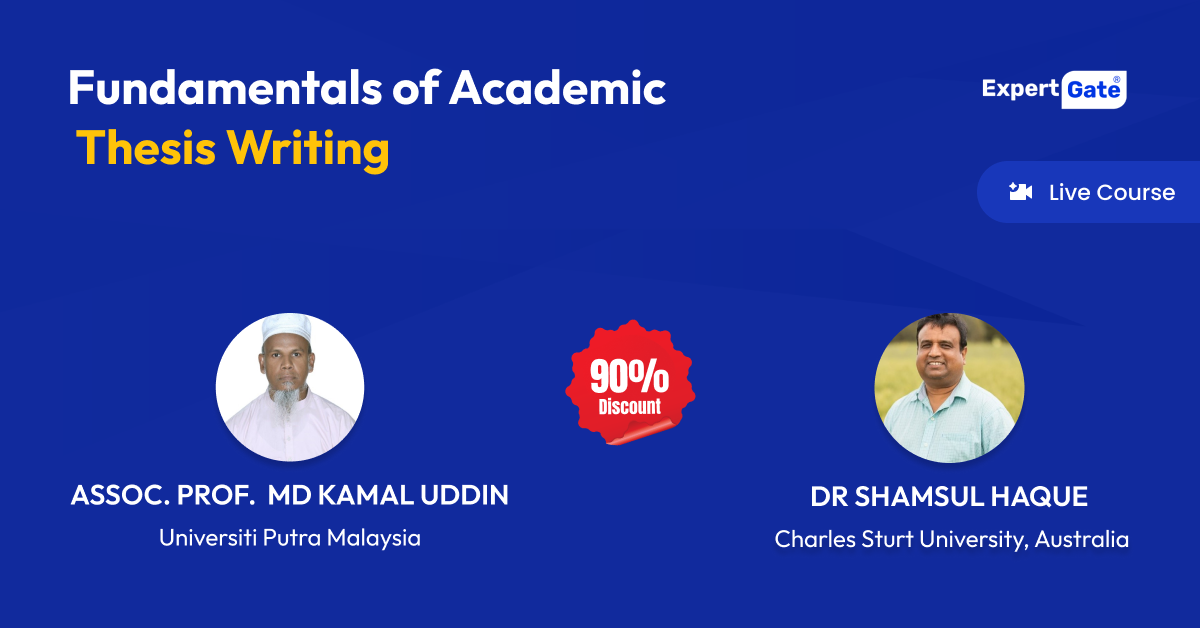Course Overview
The Fundamentals of Academic Thesis Writing course is designed to provide graduate students, researchers, and early-career academics with the essential tools to effectively write, organize, and present a high-quality thesis. A well-crafted thesis is a cornerstone of academic research, and this course will guide participants through each stage of the thesis writing process. From developing research questions and literature reviews to presenting findings and drawing conclusions, this course ensures participants are equipped with the skills needed for success.
The course will cover all critical aspects of thesis writing, including structuring the document, writing clear and coherent arguments, properly citing sources, and reducing plagiarism. Each week will focus on a specific phase of thesis writing, starting from the introduction and problem statement, moving to methods and analysis, and finally addressing results, discussions, and conclusions.
By the end of the course, students will have a solid understanding of thesis writing processes, strategies for efficient research, and practical skills to enhance the quality of their academic work.
Instructors
Prof Dr Kamal Uddin has over 22 years of experience in Soil Science and Weed Science, currently serving as an Associate Professor in the Department of Land Management at the Faculty of Agriculture, Universiti Putra Malaysia, since November 2019. My career began as a Scientific Officer at the Bangladesh Rice Research Institute (BRRI) in June 2001. I have earned a PhD in Agronomy from Universiti Putra Malaysia (2010), preceded by a BSc in Agricultural Science (1998) and an MS in Soil Science (2000) from Bangladesh Agricultural University. In my current academic role, I teach courses such as Fundamentals of Soil Science (SST3005) and Principles of Weed Science (AGR3102) at the undergraduate level, and Scientific Writing and Publication (SPS5904) at the postgraduate level. I have supervised two MS and five PhD students to graduation and am currently guiding five PhD and two MS students. I have led 20 research projects, including seven as Principal Investigator and eight as a co-researcher, with funding from esteemed organizations such as the Ministry of Higher Education Malaysia, DFID (UK), IRRI (Philippines), and NATP, PARTNER (Bangladesh). My research focuses on Environmental Soil Chemistry, Soil Management, and Agronomy. I have an h-index of 25 with 2592 citations on Google Scholar and 23 on SCOPUS. My publication record includes 123 journal papers (112 in citation-index journals), five books, and 15 book chapters. I developed the Keyword, Sequence, Importance (KSI) model to improve the quality and efficiency of thesis and publication writing. I have received the Excellence Service Award from the Vice Chancellor of UPM for six consecutive years (2017-2023) and earned silver and bronze medals in research paper competitions at UPM in 2010 and 2011. I am the Editor-in-Chief of the Journal of Agricultural Science & Engineering Innovation (JASEI), a Guest Editor for Sustainability, and serve as an Editorial Member for Fundamental and Applied Agriculture.
Dr. Shamsul is a lecturer at SAEVS and teaches Soil Science, Soil Management and Summer Cropping Systems subjects at Charles Sturt. His PhD focused on the factors affecting the options for crops capable of following flooded rice in Southern NSW. He participated in multiple projects valued at over $6.5M. His major projects include GRDC-funded long-term crop rotation management, GRDC-funded cover crop management, MLA-funded soil-dung beetle relation on the soil functions project, CSU-funded impact of soil amendment on soil fertility and nutrient cycling trials, DAFF-funded soil extension smart farms project, DAFF-funded drought resilient long term crop rotation project and Solar-Industry funded agrivoltaic systems for the production of dryland pastures. Dr Haque has published over 30 research articles, conference proceedings and grower notes. Shamsul currently supervises HDR students funded by Gulbali Institute and the Australian government.
Course Outcomes
Clear Problem Statement and Research Objectives: Participants will be able to craft a concise and focused problem statement, setting the stage for their research. They will also learn to define clear, researchable objectives aligned with their overall thesis goals.
Effective Literature Review Writing: Learners will develop the skills to conduct a thorough literature review, synthesising key findings, theories, and gaps in the existing research. They will understand how to organise the review in a logical, cohesive manner to strengthen their thesis argument.
Research Methodology Design: Participants will gain expertise in selecting and applying the appropriate research methods for their project. Whether qualitative, quantitative, or mixed methods, learners will know how to design data collection instruments and analyse data effectively to address their research questions.
Clarity in Presenting Results and Discussion: Learners will master the art of presenting results using visual aids like tables and graphs, while also discussing the findings in relation to their hypotheses and the wider academic field.
Strong Conclusion and Thesis Finalisation: Participants will be able to summarise key findings in a compelling conclusion, discuss their implications, and present clear suggestions for future research. They will also gain essential skills in editing, revising, and formatting their thesis for submission.

